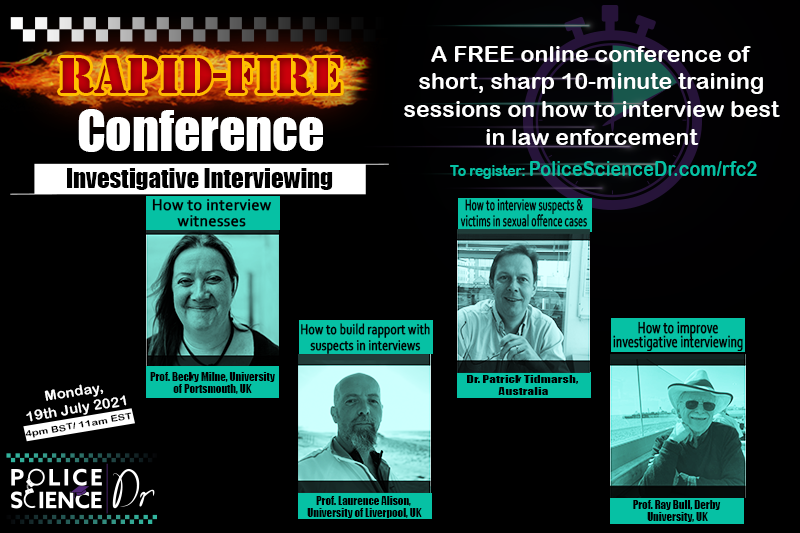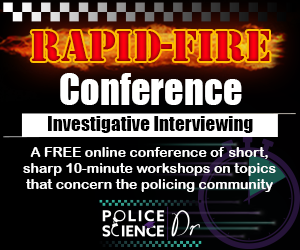On Monday, 19th July, at 4pm (BST), Police Science Dr is holding its 2nd Rapid-Fire conference supported by Policing Insight, this time focusing on gathering evidence from victims, witnesses and suspects. The speakers are a unique group of world-class experts in their respective fields, and they have agreed to deliver 10-minute training sessions at this event.
Register here to book your free seat at this event and to obtain a certificate of attendance: https://www.policesciencedr.com/rfc2
Unlike many other conferences that have lengthy, dry talks that delegates then struggle to remember anything from, our Rapid-Fire conferences stream short, sharp, practical training sessions to a global live audience of law enforcement practitioners.
Here’s the line-up:
Dr Patrick Tidmarsh, Melbourne University, Australia, creator of the ‘Whole Story’ approach to investigating sexual offences
· How to interview victims and suspects in sexual assault cases
Professor Becky Milne, University of Portsmouth, UK, expert on the cognitive interview
· How to interview witnesses
Professor Laurence Alison MBE, University of Liverpool, UK, creator of a unique way of interviewing high-value detainees based on addiction therapy
· How to establish rapport with suspects in interviews
Professor Ray Bull, Derby University, UK, co-creator of the PEACE model of interviewing and co-author of recent UN guidance on effective interviewing
· How to improve investigative interviewing
Register here to book your free seat at this event and to obtain a certificate of attendance: https://www.policesciencedr.com/rfc2
What is Police Science Dr?
Police Science Dr is an online space where academic findings and best practice in police work are made pleasantly consumable by cops and police staff; they don’t usually have access to academic journals, and if they did, they wouldn’t have the time to read dry, lengthy articles that often debate theories and methodologies. Research that is actually relevant to those in law enforcement, in a practical way, can be watched on the Police Science Dr website in the form of videos, listened to in the form of a podcast, and read in the form of the videos’ transcripts. The transcripts can only be viewed by individuals who join the free email list, which gives them access to the website’s ‘Read’ page.
Research that is actually relevant to those in law enforcement, in a practical way, can be watched on the Police Science Dr website in the form of videos
Another perk for subscribers are the weekly Police Science Snippets that are emailed out, which extract 3 golden nuggets of information from scientific research articles, with the link to the original papers. These Snippets have been extremely popular, as the single criterion for their inclusion in the weekly mail-out is that the Snippet on its own provide information that somebody working for the police can act on, take into account for their own work, or start implementing right away. They cover a range of topics, such as homicide investigations, geographic profiling, crime analysis, interviewing of suspects or witnesses, response policing, sex-offending, and many other areas relevant to law enforcement.
Readers are invited to register for the free conference: www.PoliceScienceDr.com/rfc2, to watch anything in the video gallery: www.PoliceScienceDr.com/watch and to sign up to the free email list, to receive the weekly Police Science Snippets, be the first to know about new videos, events or courses that are relevant to all those in policing with an open mind to developing their skills and capacity, and police research. To join the email list, simply submit your details in the form on the website.




